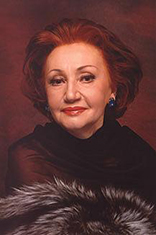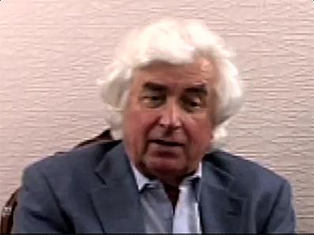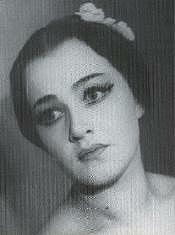Osipov was born into a musical family. His father Nikolaj Aleksandrovich Osipov studied at the Moscow conservatory
with Sofya Preobrazhenskaja, but
he was forced to abandon professional singing in order to feed his family. For Osipov, too, it was necessary to earn
extra money. When he studied, he unloaded railroad cars.
When asked in an interview at which point he had become aware of his vocal gift,
Osipov replied it began when he saw a Tarzan movie and tried, like many post-war young adults, to imitate Tarzan's yell.
His first singing teacher, who believed in him, was Nina Petrovna Olejnikova.
While unloading railroad cars, Osipov was introduced to an elderly Italian,
who managed the storage at the railway station. That Italian proved to be a tenor and a former soloist of the
Rome opera, where he had sung Raoul according to Osipov. In some unknown way, he came and stayed in Russia. He was also a survivor of
Stalin's camp and recently freed. Both of them became friendly. From that time on
for four years, the Italian gave him singing lessons. Osipov refused to name him
when he was interviewed.
Many years later, Osipov recalled, after a chance encounter in the latter's Moscow dacha, famous Bolshoj baritone Aleksej Ivanov
gave him a letter of recommendation for conservatory rector Aleksandr Sveshnikov. Osipov was
accepted to the preparatory department of the Moscow conservatory. However six months later, Osipov was expelled as having
no voice.
Osipov contiuned to study. He tried again to enter the conservatory, but was once more shown the door: no voice.
He managed to enter Gnesin. In 1967, he graduated from there (class of
D. F. Tarkhov).
Contemporarily, he worked as a soloist in Sokolov's choir.
But Osipov, of course, preferred opera, and fate smiled upon him, one day in 1967 – when he was passing
by the Stanislavskij and Nemirovich-Danchenko Theatre. There was
an audition for new singers. Well, he sang José's aria, and the death of Otello.
The theater director Vladimir Aleksandrovich Chajkovskij came to him and told him to start working
tomorrow. Osipov became one of the stars of the
Stanislavskij and Nemirovich-Danchenko Theater. Three and a half decades, Osipov remained loyal to that house.
Among his roles were: Pinkerton, Cavaradossi, Canio, Arrigo (La battaglia di Legnano), Ernani,
German, Vodemon, Vakula, Sergej (Katerina Izmailova), Savva (Bezrodnyj zjat by
Khrennikov), Triquet, Otello, Antonov (V burju by Khrennikov), Andrej (Semja Tarasa by Kabalevskij), Young Gypsy (Aleko)...
A huge success was his José, when German director Walter Felsenstein produced Carmen at the Stanislavskij and
Nemirovich-Danchenko Theater. The orchestra was conducted by Dmitrij Kitaenko,
Emma Sarkisyan
was Carmen and Galina Pisarenko was Micaëla.
That production lasted 15 years.
 |
 |
 |
| Sarkisyan | Kitaenko | Pisarenko |
As a result, Felsenstein invited Osipov to sing José also at the Komische Oper in Berlin, where he would sing that role for
ten years.
In 1981, Osipov started teaching singing: First at the GITIS (State Institute for Theatre Arts), and after 1985 at the Gnesin.
Osipov sang in many Russian cities, in all other republics of the USSR, in European
countries (Italy, Germany, Switzerland, Austria, Great Britain, Belgium, Poland, Hungary, Czechoslovakia, Romania, Bulgaria, Greece),
the USA, India and Japan.
Osipov continued to appear up to his death. He died during a rehearsal on January 27, 2009. When he died,
he was undoubtedly one of the most famous tenors in the country.
While Eastern Europe in general and Russia in particular have beyond doubt maintained quality
in operatic singing for a much longer time than the rest of the world (and in some cases, they've maintained it even up to our days),
it's the proof that there is no such thing as a Promised
Land of opera, not even in Russia, if a positively horrible shouter and pusher like Osipov could become of the country's most famous
tenors...
Reference 1
Reference 2
Reference 3
Reference 4


